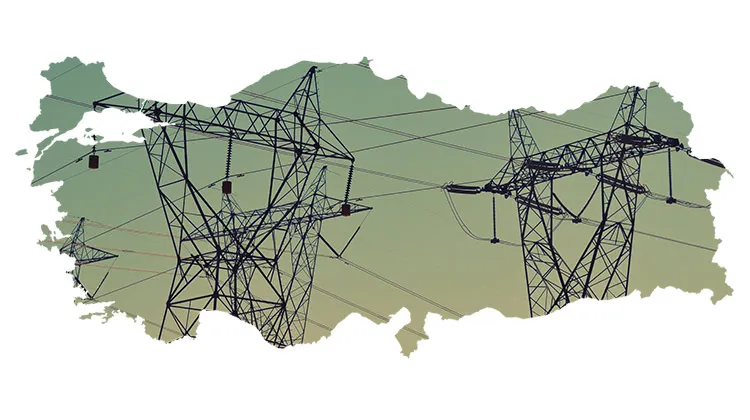As is known, Turkish energy sector has been in a liberalization process for a long time and compared to other energy markets, the electricity market is in the fore especially regarding the legislation. Recently, the eligible customer limit in electricity market has been decreased to 4500 kWh from 5000 kWh for a year within the Resolution of the Energy Market Regulatory Board in January 2014.
What is an eligible customer?
The term of "eligible customer" has entered into the Turkish Electricity Market Laws within the frame of the Eligible Customer Regulation in 2002. Accordingly, an eligible customer has been defined as a customer that is directly connected to the transmission system or that consumes more electricity energy than the limits stated in the legislation and that may determine his supplier. This limit was 9.000.000 kWh in 2002 for a year and has been reduced year for year. This limit is expected to be increased to 0 kWh until 2015. Accordingly, it is intended that all customers become eligible customers and the electricity distribution is opened to competition.
The electricity market opening for the eligible customers in the EU has begun within the Directive 96/92 EC that has been enacted in 1996. Since 2007, the European electricity market has been opened to all customers. The amendments in Turkish laws mentioned above has been implemented in accordance with these EU-Directives and the total adaptation will be provided after the repeal of limits for eligible customers.
The legal relationship between the supplier and the eligible customer is based on a bilateral agreement which may be drawn up freely by the parties. The most important target of eligible customers is to obtain the electricity energy for the lowest price. Due to these factors, the number of the private electricity suppliers have been increased and competition between these companies has been provided to a large extent.
Problems which may arise
One of the frequently asked questions by eligible customers is if the electricity energy supply may be interrupted or if the quality of the supplied energy may change, how the prices and reductions in the prices are calculated. Important is at this point, that these questions shall be clarified by the electricity suppliers.
How to be an electricity supplier?
Pursuant to the related legislation, each market activity is subject to the related license procedure. The conditions of a supplier license have been regulated by the related laws. Accordingly, the license procedures and conditions shall be fulfilled for this market activity.
The increase of eligible customers' number in the electricity market will influence the electricity market positively. The increase of energy demand will increase the market competition and also the quality of the provided service. According to above mentioned information, after the removal of eligible customers' limit as planned in 2015, the adaptation of Turkish electricity legislation to the EU-Directives will provided to a large extent.
Bilateral Investment Promotion and Protection Agreements of Turkey
Starting with the trade liberalization and opening up of the economies world over accordingly, each country has been trying to attract foreign capital through liberalized investment policies. In this connection, foreign investors started to seek investment destinations which provide most protective, hospitable and profitable climate for their investments. Consequently, many countries have entered into Bilateral Investment Promotion and Protection Agreements (BIPPAs) which not only encourage capital flows into their own countries but also provide safe business environment for their own investors abroad. The multilateral trading system is basically an attempt by governments to make the business environment stable and predictable.
In accordance with the purpose of BIPPAs, each contracting party should encourage and create favorable conditions for investors of the other contracting party to make investments in its territory, and admit such investments in accordance with its laws and policy. Investments of investors of each contracting party should at all times be subject to fair and equitable treatment and enjoy full protection and security in the territory of the other contracting party.
Objectives
Since the main purpose of BIPPAs is to increase capital flow between the contracting parties and determine the conditions that shall be applicable to foreign investors in the legal system of hosting country, it is also a good opportunity for developed countries to give access to developing or less developed countries regarding new technological and industrial developments. Therefore, in addition to provide new market opportunities to foreign direct investors with these agreements; technology and know-how flow can also be accomplished between countries as well as capital flow.
The objectives of BIPPAs mainly are:
- Promoting foreign direct investments among contracting states
- Considering the reciprocity principle, protecting foreign direct investors against national legal system of the territory
- Provide equal and fair treatment to foreign direct investors complying with the most favored nation and national treatment principle
- Establish confidence that profits and other incomes foreign investors gained from the invested country can be transferred without any delay
- Stabile, secure and equal level of investment for investors as well as predictability
- Open, fair and undistorted competition
Functions of Investment Agreements
- National Treatment Principle: According to that principle imported and locally-produced goods should be treated equally — at least after the foreign goods have entered the market. The same should apply to foreign and domestic services, and to foreign and local trademarks, copyrights and patents. National treatment only applies once a product, service or item of intellectual property has entered the market. Therefore, it is important to mention that charging customs duty on an import is not a violation of national treatment even if locally-produced products are not charged an equivalent tax.
- Most Favoured Nation Principle: Under the terms of BIPPAs, countries cannot discriminate between their trading partners. If one country is given better trade terms by another, then all other states must get the same terms. Most favored nation status is a method of preventing discriminatory treatment among members of an international trading organization as well. Most favored nation status provides trade equality among partners by ensuring that an importing country will not discriminate against another country's goods in favor of those from a third. Once the importing country grants any type of concession to the third-party country, this concession must be given to all other countries.
3.Investments of investors of either contracting party cannot be nationalized, expropriated or subjected to measures having effect equivalent to nationalisation or expropriation in the territory of the other contracting party except for a public purpose related to the internal requirements for regulating economic activity on a non-discriminatory basis and against fair and equitable compensation.
In that case, compensation should be the amount to the genuine value of the investment expropriated immediately before the expropriation or before the impending expropriation became public knowledge, whichever is the earlier, will include interest at a fair and equitable rate until the date of payment, should be made without unreasonable delay, be effectively realizable and be freely transferable. In case of an expropriation government should pay the market value of the land which belongs to the foreign direct investor without any delay.
- 4. Investors of one contracting party whose investments in the territory of the other contracting party suffer losses owing to war or other armed conflict, a state of national emergency or civil disturbances in the territory of the latter contracting party shall be accorded by the latter contracting party treatment, as regards restitution, indemnification, compensation or other settlement, no less favorable than that which the latter contracting party accords to its own investors or to investors of any third States. Resulting payments can be freely transferable.
- With the BIPPAs, the opportunity is given to foreign direct investors that when a dispute arises between the government and foreign direct investor, international arbitration shall be applicable which prevents arbitrary approaches of national courts against foreign direct investors.
Agreements of Turkey
Turkey currently has BIPPA’s with over 74 countries in the world from Europe, USA, Africa and Asia. Some of those agreements are signed with Afghanistan, Albania, Argentina, Australia, Austria, Azerbaijan, Bangladesh, Belarus, Belgium, Bosnia and Herzegovina, Bulgaria, China, Croatia, Cuba, Czech Republic, Denmark, Egypt, Estonia, Ethiopia, Finland, France, Georgia, Germany, Greece, Hungary, India, Indonesia, Iran, Israel, Italy, Japan, Jordan, Kazakhstan, Kuwait, Kyrgyzstan, Latvia, Lebanon, Libya, Lithuania, Luxembourg, Macedonia, Malaysia, Malta, Moldova, Mongolia, Morocco, Netherlands, Oman, Pakistan, Philippines, Poland, Portugal, Qatar, Romania, Russian Federation, Saudi Arabia, Serbia, Singapore, Slovakia, Slovenia, South Korea, Spain, Sweden, Switzerland, Syria, Tajikistan, Thailand, United Arab Emirates, Yemen, United Kingdom, United States of America, Tunisia, Turkmenistan, Ukraine, Uzbekistan.
The first BIPA was signed with Germany in 1962. By year of 2012, Turkey officially signed BIPA with 84 different countries and 75 of those agreements are currently in force including all countries in the EU excluding Ireland and the Republic of Southern Cyprus and all member countries of OECD excluding Ireland, Canada, Norway, Mexico and New Zealand.



